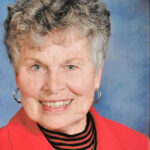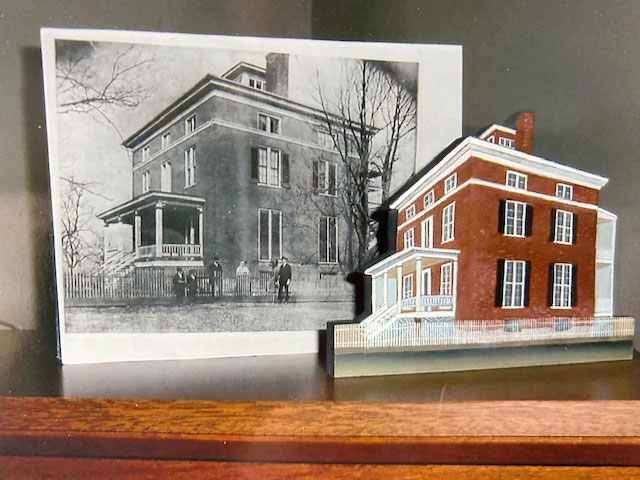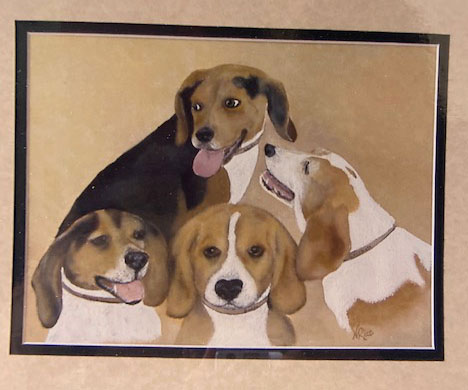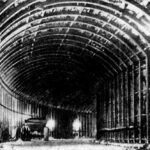written by James Rada, Jr.
A new serial fiction romance story for your enjoyment
6: A Life to Live
Margaret Rosensteel walked home to the family farm west of Emmitsburg. She walked in a daze, stunned at what Mrs. Sachs had said to her about not being able to see Caleb Sachs. How could Caleb’s mother say Margaret wasn’t good enough for her son? Margaret was a good person. She and Caleb were just friends. Well, maybe there was more there, but they hadn’t explored the possibility. They hadn’t the chance. Everyone was against them. Did they see something between her and Caleb that they didn’t see?
Margaret hadn’t taken an interest in a boy in quite a while. She avoided those feelings. Her interest in Caleb had just snuck up on her, but it seemed like she wasn’t the only one with a destiny, at least according to Mrs. Sachs.
Dinner was quiet. No one said much except for the younger children. Margaret’s parents kept looking at each other. After dinner was finished and the dishes washed, Margaret’s parents called her into the parlor.
“We need to talk to you about a decision we’ve made,” Samuel Rosensteel said. Margaret’s mother laid a hand on her husband’s shoulder. “But first, we want you to know that we think nothing inappropriate happened.”
Inappropriate? So were her parents now going to come out against her and Caleb?
Her father said, “That’s right. We know you’re a good girl, but nothing can come of this relationship between you and Caleb Sachs.”
“What relationship?” Margaret asked. “I admit I like him, but we only met for the first time at the dance.”
“Well, that’s fine. Then this shouldn’t be a problem for you. Your life has been committed to God, so we have decided to send you to the sisters early.”
Margaret jumped up. “What?”
“You are getting to the age where boys can turn your head. Your brothers and sisters certainly seem to think you’ve taken an interest in Caleb. Sending you away now will avoid that problem.”
Margaret nodded. “I understand… but I’m not sure I want to go.”
“That’s why we’re sending you away. You’re letting your emotions get the better of you.”
Margaret shook her head. She stood up and left the house for a second time today without a word. Outside, she ran off into the fields. She didn’t know where she was going. She didn’t care. She just wanted to get away.
When she tired of running, she started walking until she reached Gettysburg Road. She turned south and headed into town. She saw St. Joseph’s Church and went inside.
It was dim, except near the front of the church where candles burned. She walked up to the first pew, genuflected, and slid into the seat. Then she bowed her head and prayed. She needed help. She didn’t understand what was going on, not with Caleb, not with everyone else. What should she do?
Rosa Sachs walked upstairs to Caleb’s bedroom. He was sitting on the edge of his bed, staring out his window. He wasn’t looking at anything in the street, just staring off into the distance.
“Caleb, how are you feeling?” Rosa asked.
Caleb looked over his shoulder. “I’m sore, but I’ll be fine.”
“We should call the sheriff.”
“Why? I don’t know who did this to me.”
“I think you do.” She paused. “Even so, I know who they were. We can’t go around letting men beat up children.”
“How do you know?”
“That girl you’re mooning over came to see how you were.”
Caleb stood up. “Why didn’t you tell me?”
“Because she’s not the girl for you. I told her the same thing I told you. She’s not Jewish, so she won’t be marrying you.”
Caleb shook his head. “You’re putting the cart before the horse.”
“I am not.”
“I don’t know what life has in store for me. It’s not like I’m on a train going along a fixed path where the destination is the most important thing. I want to enjoy the journey and explore my life.”
His mother scoffed. “And you want to explore it with that girl? She’ll lead you in the wrong direction.”
“How do you know that? How do you know what my life is going to be? It’s my life, and I don’t know. You’re no better than her brothers. They tried to scare me off. You tried to scare her off. What is everyone so afraid of? That we’ll be happy?”
“Happy? You will be miserable. Both of you. That’s what we want to help you avoid,” Rosa said.
“I like her. I like her a lot. I want to spend time with her. I don’t know if I love her, but I suspect I might. If not now, certainly in the future.”
“And what has that brought you? A beating. Arguments with your mother who loves you.”
“Neither of which I caused.”
He sat back down and stared back out the window. Rosa stared at him for a few moments more and then turned and left.
Caleb walked into a church for the first time. Only a few people filled the pews, and he quickly found Margaret near the front. He walked up the aisle and sat down next to her. He said nothing because it looked like she was praying.
She finished and looked up.
“Caleb, what are you doing here?”
“I figured you might be here after what my mother said to you.”
Margaret frowned. “Not just her. My parents want to send me to sisters early.”
“Because of me?”
She nodded. “Are we wrong?”
“Does it feel wrong?”
She shook her head. “No.”
He took her hand in his. “Then I don’t think it’s wrong. It’s not easy, but no one has had it easy since Adam and Eve were cast out of the Garden of Eden.”
“But everything is so confusing now. It seems like everyone is against us.”
She leaned her head on his shoulder.
“I saw you praying,” Caleb said. “Did it help?”
“Not yet.”
“I want you to know that I won’t hold you back from your promise, but while you’re still free, I want to be with you and get to know you better. I want to have lots of wonderful memories to look back on and comfort me after you leave.”
“But it would break my heart,” Margaret said.
“And mine, too. I think that will tell me it’s worth it. If you were to leave, and I felt nothing, it would be like I had nothing invested in our relationship. I’m willing to hurt for a long time if it means I can be truly happy for a short time with you.”
She stared at him, her eyes glistening with tears. She nodded. “Yes.”
He smiled. Then he leaned down and kissed her. He pulled back, smiling.
“I said what I needed to say. I’ll leave you to your praying now,” Caleb told her.
He got up and left the church.
Father Harmon stood up from the pew where he had been sitting and doing his own praying. He walked over to where Margaret sat. She looked up, a bit startled.
“Forgive me, Margaret. I didn’t want to intrude.”
“You heard me talking with Caleb?”
He nodded. “Yes. Well, the young man has stated his intentions. Now the decision is yours.”
“What should I do?”
He motioned to the pew. “May I sit?”
“Please.”
The priest sat down and leaned against the back of the pew. “You have two admirable choices: Become a Daughter of Charity and be married to God or become a wife and raise a family in faith.”
“We haven’t talked about marriage. We barely know each other.”
“That may be true, but if it is, why does the decision trouble you? Your choice would be between an honorable life of service and a relationship you don’t think will last.”
“I don’t know how my life will be if I stay for him, but I do know what it will be like with the sisters.”
Father Harmon nodded. “Do you believe in Jesus?”
“Yes, Father, of course.”
“Well, he was a Jew. So loving a Jew must not be a sin, and I know your particular Jew. He is a good boy from a good family. If you were not committed to the sisters, your family might not worry.”
“But his family…”
Father Martin nodded. “Yes, that could be a problem, but those types of problems often resolve themselves, particularly when grandchildren come along.”
Margaret gasped. “Father, you have me married with children, and I don’t even know if I love him.”
“Then you need to decide that.”
“But would it be fair to get involved with him and then leave him?”
“Would it be fair to commit yourself to the Daughters with unresolved feelings? You must make that decision. That is why we are given life on earth, to make decisions and hopefully make the correct ones.”
Hot Weather Safety Tips for Our Furry Friends
Give them plenty of fresh, clean water. Pets can get dehydrated quickly. Make sure they have some shade. Your pet needs to have a shady place to get out of the sun and take a break from the heat. Don’t over-exercise them. When it’s hot out, shorten your walk or make sure you give your best buddy breaks in the shade during exercise. Keep them indoors when it’s extremely hot. Maybe take your walk in the evening when it cools down a bit. Your furry friend will thank you. It’s important to know the symptoms of overheating in pets: excessive panting or difficulty breathing, increased heart and respiratory rate, drooling, mild weakness, stupor, or even collapse. Symptoms can also include seizures, bloody diarrhea, and vomit, along with an elevated body temperature of over 104 degrees.
And, of course, never leave your animals alone in a parked vehicle in the summer heat.
Our pets love being with us all the time, even when it’s hot and uncomfortable for them outside. They will never complain! So, let’s make sure we keep them safe and happy outdoors during the summer.







